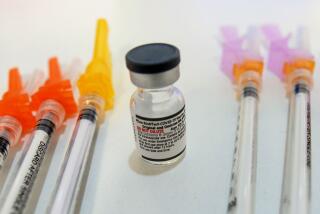MEDICINE / AIDS RESEARCH : Tests Show Vaccine Helped Increase Immunity
- Share via
An experimental vaccine intended to control AIDS by bolstering the immune systems of people infected with the AIDS virus appears to be safe and apparently was able to boost the immunity of 19 of 30 patients tested, a new study shows.
The study, published today in The New England Journal of Medicine, did not examine whether people given the vaccine remain healthy or live longer than others. A study exploring its effectiveness against the virus is under way.
“We have not demonstrated that these immune responses that we stimulated are in fact causing a decrease in the amount of virus,” said Dr. Donald S. Burke, an author of the study. “Nor have we demonstrated that this will prolong life.
“We have shown that it is possible to boost the immunity (of infected people),” said Burke, who directs AIDS research for the U.S. Army. “This has been a dream of persons working in the field of infectious disease for a long time.”
Experts were cautious in reacting to the report. Several said the findings improve the likelihood of some day fighting AIDS through so-called post-infection immunization--an approach they said might eventually prove useful against other chronic infections, particularly viral ones. But they also stressed that there is no evidence yet that this vaccine works.
“We have to be careful that this does not get sold as a breakthrough or as an important new advance in therapy,” said Dr. Anthony S. Fauci, head of the U.S. National Institute of Allergy and Infectious Diseases. “Because, at this point in time, it certainly is not that.”
The paper’s authors, led by scientists at Walter Reed Army Institute of Research, studied 30 men and women in early stages of infection with the human immunodeficiency virus. Each received injections of the vaccine, known as recombinant gp160, a genetically engineered copy of a protein on the surface of the AIDS virus.
In 19 subjects, the researchers found evidence that the vaccine had stimulated an immune response--that is, they detected additional disease-fighting proteins, called antibodies, and found that immune system cells were able to recognize and respond to the virus.
Under normal circumstances, such immune responses suggest an ability to reduce the presence of virus in the body. Whether that is true for the AIDS virus and this vaccine is the subject of a more extensive, longer-term study.
“Now it remains for us to determine if the approach really helps people,” said Burke. “Do they remain healthy longer? And are there better ways to boost the immunity than this?”
Nevertheless, the researchers did find that in the 19 patients who responded to the treatment that levels of certain immune-system cells stabilized, rather than continuing to drop as they had since the infection began. The study period was too short to determine whether the stabilization was significant.
While most vaccines are used to prevent infection before it occurs, the idea of a post-infection vaccine is not new. Louis Pasteur used one for treating acute rabies infection in the 19th Century.
In 1987, vaccine pioneer Jonas Salk proposed using post-infection immunization against the AIDS virus. He and other researchers at USC have since been studying the effectiveness of a vaccine made from a chemically inactivated form of the AIDS virus, not unlike his famous polio vaccine.
Burke, citing Salk, said there are others “in the field trying different approaches simultaneously. We’re all trying the same thing. . . . What we showed was unequivocal, scientific evidence that we can boost their immunity.”






